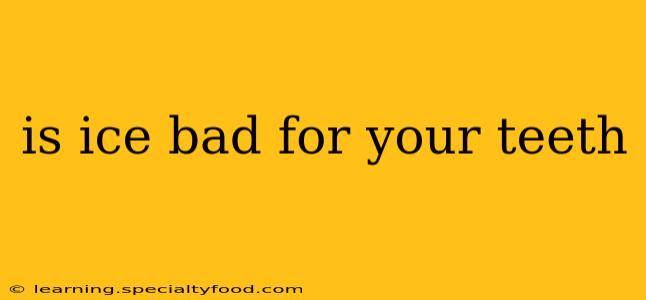The satisfying crunch of ice in a cold drink is a pleasure many enjoy, but is this habit harming your pearly whites? The short answer is: it can be. While the occasional ice cube won't likely cause significant damage, consistently chewing on ice can lead to a variety of dental problems. Let's delve into the details.
How Does Chewing Ice Damage Teeth?
The hardness of ice makes it an abrasive substance. When you repeatedly chew on ice, you're essentially creating a mini-sandblasting effect on your tooth enamel. This weakens and wears down the protective outer layer of your teeth, increasing your vulnerability to cavities, sensitivity, and other dental issues. Think of it like constantly scratching a delicate surface – eventually, it will show significant wear and tear.
What are the Specific Dental Problems Associated with Ice Chewing?
The damage from chewing ice isn't always immediately apparent, but the cumulative effects can be significant. Here's a closer look at potential consequences:
- Cracked or Chipped Teeth: The force exerted on teeth while chewing ice can lead to cracks or chips, especially in already weakened teeth. These fractures can be painful and may require extensive dental work to repair.
- Fractured Fillings or Crowns: If you have existing dental restorations, chewing ice puts extra stress on them, potentially leading to fractures or dislodgement. This necessitates further dental intervention and expense.
- Tooth Sensitivity: Once the enamel is eroded, the dentin underneath becomes exposed. Dentin is much more sensitive to temperature changes and various stimuli, leading to increased pain and discomfort when consuming hot or cold foods and drinks.
- Increased Risk of Cavities: Weakened enamel is more susceptible to bacterial attack, leading to an increased risk of cavities and tooth decay.
What if I Only Chew Ice Occasionally?
Occasional ice chewing is less likely to cause significant damage, but it's still advisable to minimize this habit. The cumulative effect of even infrequent chewing can contribute to long-term dental problems.
Is it Worse to Chew on Ice Cubes or Crushed Ice?
While both forms can be damaging, chewing on larger ice cubes presents a greater risk of chipping or cracking teeth due to the increased force involved. Crushed ice still carries a risk of abrasion, albeit potentially less severe.
How Can I Stop Chewing Ice?
Breaking this habit requires conscious effort and finding alternative ways to satisfy the craving. Here are some suggestions:
- Identify the underlying cause: Are you chewing ice due to a thirst craving, a sensory need, or boredom? Addressing the root cause can help break the cycle.
- Substitute with healthier alternatives: Try chewing sugar-free gum or enjoying crunchy fruits and vegetables as healthier alternatives.
- Mindfulness techniques: Pay attention to your actions and consciously make the choice to avoid chewing ice.
- Hydrate properly: If you frequently reach for ice because of thirst, ensure you're drinking enough water throughout the day.
What Should I Do if I've Damaged My Teeth from Chewing Ice?
If you experience any pain, sensitivity, or notice chips or cracks in your teeth after chewing ice, it's crucial to schedule an appointment with your dentist immediately. Early intervention is key to preventing further damage and ensuring effective treatment.
In conclusion, while the occasional ice cube might not cause immediate harm, the habit of consistently chewing ice poses a significant risk to your oral health. By understanding the potential consequences and implementing strategies to break this habit, you can protect your teeth and maintain a healthy smile for years to come.
